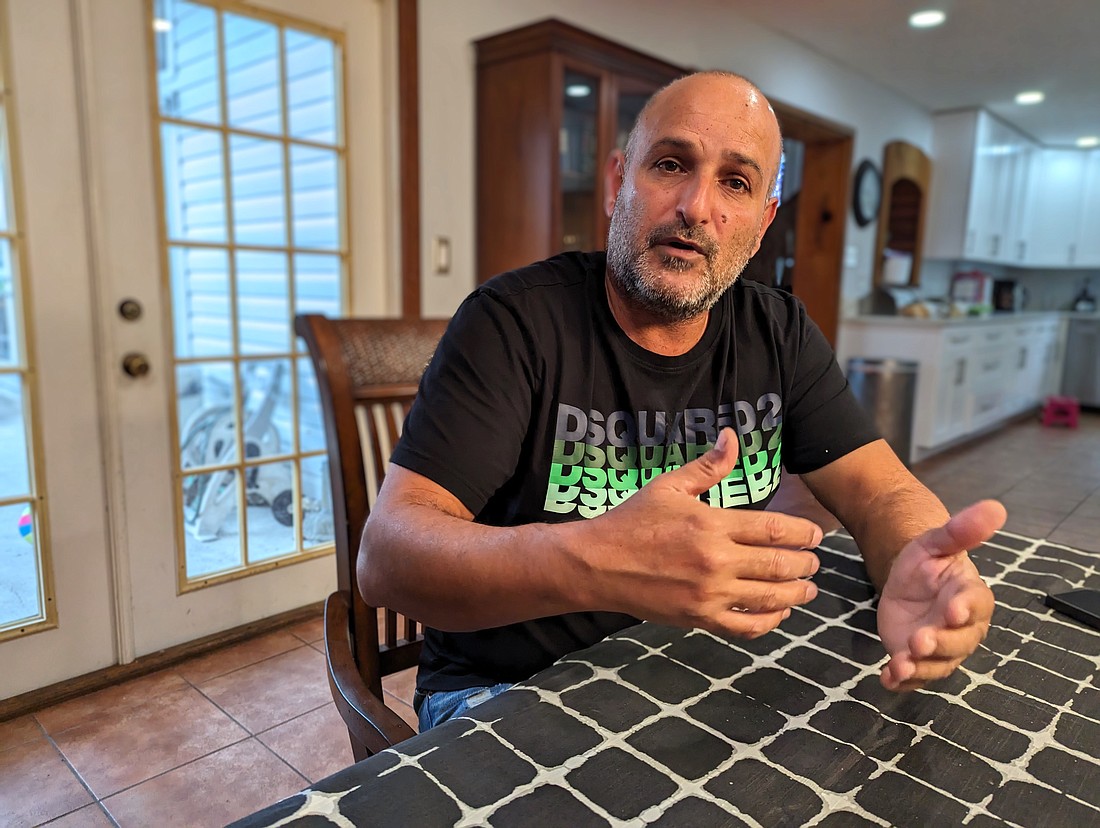- January 31, 2025
-
-
Loading

Loading

Since his two Salty Turtle gift shops were among the Flagler Beach businesses spray-painted with antisemitic messages on Nov. 19, Tomer Oshri said he, his wife, Yasmine, and their four children, are keeping their eyes open.
“It’s not just happening here, it’s all over the world,” he said.
In the month following the Oct. 7 Hamas attacks on Israel, the Anti-Defamation League documented 832 anti-semitic incidents across the United States, an average of nearly 28 a day, representing a 316% increase from the same period a year ago.
There has also been an “unprecedented” increase in anti-Arab and anti-Muslim incidents in the U.S., according to the Council on American-Islamic Relations. Three Palestinian college students in Burlington, Vermont, were seriously injured after a man shot them at close range on Saturday, Nov. 25.
Oshri is a Jewish Israeli who proudly flies the Israeli flag in front of his shops. He has been very outspoken in his support for Israel. Since the state of Israel was established in 1948, it has been fighting for its very existence, he said.

Oshri met his wife, Yasmine, in Israel. Their two oldest children, Ella and Guy, who are in high school, were born in Israel. Yasmine grew up in Palm Coast and St. Augustine and the family moved to Flagler Beach 15 years ago.
Tomer Oshri, 52, served in the Israeli army for the required three years from age 18 to 21 and was in the reserves for over 10 years.
“I’d rather be there right now and fight,” he said. “But they don't need me. If they would call me, I would go in a heartbeat.”
Oshri has a son from a previous marriage, Adir, 21, who lives in Israel and is in the army reserves. He was called up two months ago, Oshri said.
Oshri said that since the Oct. 7 Hamas attack, he and his family have had trouble sleeping.
“We don't sleep at night,” he said. “Even my American friends, they say, ‘We can't sleep at night. We can't believe that this happened.’ And the sad thing that we can't believe is that they kidnapped so many civilians. They are holding hostages, babies.”
He answered (the phone) and said, ‘I cannot talk to you. ... We’re fighting right now.’ And I can hear the gunfire.” — TOMER OSHRI
On the night of Oct. 7, he said, he fell asleep with earbuds in his ears listening to a Seinfeld episode on his iPad. He turned over and his iPad dropped to the floor, waking him up.
“It was 2:30 a.m. I couldn’t go back to sleep,” he said. “So I picked up the iPad and I got to a news (site) in Israel.”
He couldn’t believe what he was seeing. He woke up his family. “There’s rockets … It’s a chaotic thing. … right now.”
He called a friend in Israel who lives on a kibbutz.
“He answered and said, ‘I cannot talk to you. I’m watching. I’m in a patrol right now. There are terrorists all over. My son just got shot and shot one of them, got one of them. We’re fighting right now.’ And I can hear the gunfire,” Oshri said.
Oshri knows the families of some of the 1,200 victims who were killed in the attack. This was Israel’s 9/11, he said.
Israel was different in the 1970s when Oshri was growing up, he said.
“There were a few terror attacks, but as far as the population, we got along,” he said. “My uncle was in construction. He used to do plastering. So all of his workers, he’d (pick up) from the West Bank and they could actually drive with their vehicle. They were no barriers, no checkpoints, nothing. They were coming to our house. If a Jewish family was having a party, you’d invite them, they would come to our party. If someone was getting married in their family, we would go to their villages. People used to go shopping in Gaza.”
He said it really started changing with the Oslo Accords in the 1990s.
“The West thought that if they would bring the two-state solution then we're going to have peace,” Oshri said.
Oshri supports Israel’s plan to wipe out Hamas, which the U.S., since 1997, has designated a terrorist organization. Hamas’ aim, Oshri said, is to destroy Israel and replace it with an Islamist state.
He said the recent hostage exchanges and cease fire in Israel’s war on Hamas in the Gaza Strip is a good thing, but he said the hostage exchanges should not be taken at face value. The teens and women released from Israeli prisons were throwing stones or involved in a terror activity, he said.
“It’s not women for women and kids for kids,” Oshri said. “(Hamas) took kids, mothers, elderly people.”